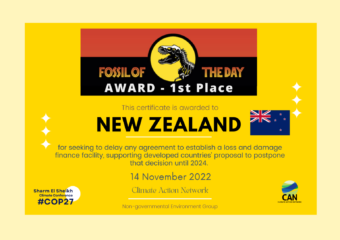The NZ Climate Action Network, a network of individual organisations that work together to tackle climate change, react to the Lawyers for Climate Action v Climate Change Commission verdict:
Cindy Baxter, Coal Action Network Aotearoa spokesperson said:
“What’s shocking in this decision is the Court’s ruling that the 1.5˚C warming limit in the Zero Carbon Act is not legally binding. We call on the government to change the Act accordingly, and on the Climate Change Commission to deliver advice as to how we get there, which it clearly has not done.
“The central issue in this court case is the creative accounting around emissions deployed by the New Zealand Government, an accounting system that makes our 2030 emissions reduction target look like a 50% cut when in fact it’s only 22%. We need more transparency around our accounting system.”
Christine Rose, Greenpeace senior agriculture campaigner said:
“This case has highlighted this government’s failure to actively protect the basic right of a safe and stable climate for all. Intensive dairying threatens this right, being to New Zealand what coal is to Australia and tar sands are to Canada. If this Government is serious about tackling the climate crisis, it must do what we already know will cut climate pollution from intensive dairying: phase out synthetic nitrogen fertiliser, substantially reduce stocking rates, and support farmers to shift to more plant-based regenerative organic farming.”
Nick Henry, Oxfam Aotearoa climate justice lead said:
“The law may not have forced the government to act consistently with the science today, but ultimately, the science will force us to act or suffer the consequences. Emissions must be cut in half globally, quickly, to avoid devastating impacts on all of humanity.
“We can only limit the worst impacts of climate destruction – the impact to homes, to the food we grow, and the places we love – if we take action at the scale necessary to keep global heating to within 1.5 degrees.
Dr Jim Salinger, Wise Response Society deputy chair said:
“We know that climate change is here. What was a river delta and the breadbasket of Pakistan is now a lake; a third of the country is under water and millions of people are displaced. Closer to home, Nelson has suffered one-in-a-hundred-year flooding accompanied by slips, erosion, wastewater pollution, and losses of hundreds of homes and other infrastructure that will take decades to fix.
“Dangerous climate extremes will continue to become more frequent and more extreme with each fraction of a degree the mean global surface temperature rises. New Zealand has committed to doing its part to mitigate climate change. This means real action to cut emissions, across all sectors of society, and it means calculating our carbon budgets using internationally respectable accounting methods.”
Together, these organisations call on the government to revise its emissions budgets in line with the science, and to urgently bring in the following policies to cut emissions:
- A proper price on agricultural emissions that will reduce pollution in line with the science of 1.5°C
- A significant reduction in synthetic nitrogen fertiliser use and a $1 billion investment in regenerative, organic farming
- No new fossil fuel vehicles by 2030, and free public transport for community service cardholders, under 25s and tertiary students
- Ending new oil, coal and gas exploration on Aotearoa soil and seas or extensions of current permits.






